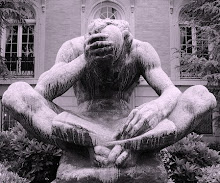 Over at The Raw Story, there's this little tidbit about FBI interrogation:
Over at The Raw Story, there's this little tidbit about FBI interrogation:Ali Soufan, a former FBI interrogator, revealed in an article being released in June that Osama Bin Laden's bodyguard opened up about the 9/11 terror attacks only after being offered -- sugar free cookies.
Bin Laden lieutenant Abu Jandal is a diabetic, Soufan said, and wouldn't eat sugar cookies he'd been offered.
I'm scared. If the FBI ever interrogates me, it won't take much to break me--but they'll have to spring for the Pepperidge Farm Milanos to get anything out of me. They put some crappy Hydrox cookies in front of me and they'd better break out the thumbscrews. I don't talk for just any crappy cookie.
But, of course, the most striking thing about this anecdote is that the soft sell works, too. I'm not arguing that 100% of the time torture gives false or useless information; I don't think that's true. Maybe these acts of torture did save thousands of American lives, but I have two problems with this argument.
1) What does it profit a nation to gain its safety and yet lose its soul? That's a revision of Matthew 8.36, and it fits us to a tee. Once you start giving up the things that make us (or that we pretend make us) who we are, there's nothing left. We are, so say the cultural conservatives, a nation with not a religion, not a race, not an individual, not a shared history, but a group of ideas at our center (that's Allan Bloom, Geoffrey Hart, and the National Review talking, not me). If we want immigrants to integrate into our nation, if we want strict Constitutionalists on the bench (Dick Cheney, Rush Limbaugh, and Sean Hannity), then we better damn well be willing to stick to those core values when the going gets tough. Oddly enough, those two blowhards are the very ones still trying to defend activities that were--and again are--deemed torture. So they're essentially saying that our core values are only important when they're not being tested. Nice.
2) Furthermore, it does not follow that because torture (did produce/probably produced/maybe produced) actionable intelligence other techniques that aren't against the Geneva Convention might have produced the same information. It's a freshman composition-level fallacy to think that the success of torture means that it was the only solution. That's a lot of faith to place in something that has such a possible downside. Non-abusive interrogation might have helped produce a Muslim world more receptive to American overtures and ideas than the large-scale entrenchment and increased radicalization that we seem to have spawned with our treatment of prisoners.
I'm not disparaging the men and women who found themselves in the position of interrogators. It is easier to inflict pain and abuse on someone you loathe. I certainly would not want to be in the position of these interrogators (many of whom were not trained as interrogators and were just thrust into the position) since they were working with prisoners that they had every right to believe were responsible for the death of thousands of Americans.
It's not surprising that vengeance rather than intelligence became the goal (how else could you hang people in a room by their wrists, place a spolight or strobe shining in their faces, and blast the Red Hot Chili Peppers at them?). Rather than working them over and making them help you, the more inviting way is to punish. It's understandable--maybe not excusable, but understandable. What is not understandable or excusable is that top-level governmental officials not only let this happen, but went out of their way to make it happen. The FBI apparently repeatedly asked for top-level permission to do some of these "enhanced interrogation techniques" before it would even allow them to take place. John Yoo and many others in the DoJ went out of their way to create a legal footing for these actions.
I think we--as with our economy, infrastructure, intelligence, election reform, ethics reform, etc.--took the easy way out. And just like all those other instances, it's going to cost us in the long run.

